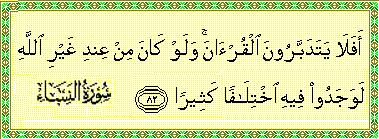One of the greatest conflicts nowadays is the perceived incompatibility between science and religion. However, this is not the state with the Holy Qur'an, the everlasting Miracle of Islam. The Qur'an has challenged man in the field he is proud of - modern science. There are plenty of references to knowledge and the pursuit of knowledge in the Qur'an. The general feeling they leave the reader with is that the pursuit of knowledge is something that should be done actively by everyone. Early Muslim scholars grasped the meaning of these verses and abided to it; being evident in their trials to understand many verses entailing the universe and its laws. To their best had early Muslim scholars carried out their assigned duty. They meditated the Holy Verses exploring all possible implications by applying all of their gained knowledge. However, nobody can ever claim that the matter has ended. This would contradict with the inimitability of The Qur'an, having everlasting wonderful gifts till the day of the end of this world. Yet, a minority of Muslims disdain or condemn contemporary efforts to mediate the verses. Suffice to those is to realize that they are simply asking all Muslims to disobey a clear-cut Qur'anic order to meditate on the signs of the Book, as Allah, The Almighty, says:
VERSE
The Holy Qur'an -the essence of Islam- is absolutely non-exclusive, universal and timeless. Its contents are not confined to a particular theme or style, but contain the foundations for an entire system of life, covering a whole spectrum of issues; i.e. it is complete and comprehensive.
Verse
Verse
Being the complete and absolutely unaltered communication from Allah Who has originated and developed the entire universe, a dichotomy or chasm between the Qur’an and science does not exist. Whenever science is claimed to produce theories or experiments that fundamentally contradict the
Qur'an, our understanding -of the Qur'an or the world- would have been to blame: the Qur'an itself is true for all times. Statements referring to modern science are scattered throughout the Qur'an. Though being linguistically clear, many of the verses were unconceptualizable to earlier Muslim scholars. It is only recently that the scientific meaning of some of these verses has been appreciated fully. The long delay in interpreting these verses resulted mainly from lack of awareness of specialized scientific knowledge. Abiding to the Qur'anic guidance to contemplate and investigate the Book (the speech of Allah) and the world around us (the deed of Allah), one can observe the remarkable harmony between the Qur'an and science. In fact, the Qur’an’s correlation with science has been startling in many branches of knowledge. Furthermore, the Qur'an goes beyond simply encouraging all human beings to be aware of the natural world. It also contains widely dispersed references on a variety of subjects, which are not only scientifically accurate, but in some cases, quite advanced relative to the time of the revelation. There is an ever-growing realization among many Muslims academics that the Qur'an appears to be addressing this age (the 21st Century) and beyond. As science progresses to new frontiers, many more verses in the Qur'an that are mysterious now, will be understood and explained better.
VERSE
" (Here is) a Book which We have sent down unto thee, full of blessings, that they may meditate on its Signs, and that men of understanding may receive admonition.) (38:29)[1]. Moreover, to condemn such studies, some evildoers have raised a fallacious notion -followed also by some naïve sciolists- that it is imprudent to associate the static text of The Qur'an with the dynamic ever-developing science. This claim entails an evident sophism as such studies mostly entail static eternal universal laws. Though the Holy Qur'an is the most ever static text regarding linguistics (being preserved by Allah as it was revealed to The Ptophet, pbuh), it is also the most ever dynamic one regarding meanings and implications.
The Holy Qur'an -the essence of Islam- is absolutely non-exclusive, universal and timeless. Its contents are not confined to a particular theme or style, but contain the foundations for an entire system of life, covering a whole spectrum of issues; i.e. it is complete and comprehensive.
Verse
"Nothing have We omitted from the Book." (6:38)
Verse
" We have sent down to thee a Book explaining all things" (16:89)
Being the complete and absolutely unaltered communication from Allah Who has originated and developed the entire universe, a dichotomy or chasm between the Qur’an and science does not exist. Whenever science is claimed to produce theories or experiments that fundamentally contradict the
Qur'an, our understanding -of the Qur'an or the world- would have been to blame: the Qur'an itself is true for all times. Statements referring to modern science are scattered throughout the Qur'an. Though being linguistically clear, many of the verses were unconceptualizable to earlier Muslim scholars. It is only recently that the scientific meaning of some of these verses has been appreciated fully. The long delay in interpreting these verses resulted mainly from lack of awareness of specialized scientific knowledge. Abiding to the Qur'anic guidance to contemplate and investigate the Book (the speech of Allah) and the world around us (the deed of Allah), one can observe the remarkable harmony between the Qur'an and science. In fact, the Qur’an’s correlation with science has been startling in many branches of knowledge. Furthermore, the Qur'an goes beyond simply encouraging all human beings to be aware of the natural world. It also contains widely dispersed references on a variety of subjects, which are not only scientifically accurate, but in some cases, quite advanced relative to the time of the revelation. There is an ever-growing realization among many Muslims academics that the Qur'an appears to be addressing this age (the 21st Century) and beyond. As science progresses to new frontiers, many more verses in the Qur'an that are mysterious now, will be understood and explained better.





